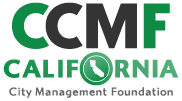What inspired you to enter city management?
 After being laid off from the bank where I had worked for several years, I entered college with the goal of returning to the banking/finance industry after earning an undergraduate degree. An internship in the budget office of a city, where the city’s leaders kept expanding the scope of my responsibilities, opened my eyes to the possibility of working in a field where money was not the main driver. As an intern, I was assigned tasks and collaborated with staff in a variety of departments—including the city manager’s office. I was impressed by the countless ways in which employees worked “behind the scenes” to provide programs and services that I until then had taken for granted. It is those caring and hardworking employees who induced me to become a public servant.
After being laid off from the bank where I had worked for several years, I entered college with the goal of returning to the banking/finance industry after earning an undergraduate degree. An internship in the budget office of a city, where the city’s leaders kept expanding the scope of my responsibilities, opened my eyes to the possibility of working in a field where money was not the main driver. As an intern, I was assigned tasks and collaborated with staff in a variety of departments—including the city manager’s office. I was impressed by the countless ways in which employees worked “behind the scenes” to provide programs and services that I until then had taken for granted. It is those caring and hardworking employees who induced me to become a public servant.
How did you become a city manager?
By not being selected as an assistant city manager (a.k.a the best job in a city). 😊
Having served as a department head for almost two decades, I was close enough to city/county leaders to not want the top job. In recent years, I had come to believe that I could make a greater contribution in the role of an assistant city manager, but that role proved to be elusive. A trusted mentor, along with a highly-respected executive recruiter, advised that I would be more competitive for the city manager position. Both strongly believed that I had the experience and wherewithal to not only be competitive but effective in the city manager role. This was counter-intuitive, and proved to be good advice since I began to get interviews from my city manager applications; then it was a matter of being selective and patient for the right opportunity.
What do you enjoy the most about your role?
The city of St. Helena is currently in the midst of several high-impact and highly visible projects including a major infrastructure investment, downtown revitalization, a water-wastewater rate study, zoning update, and the city hall move, just to name a few. Each of these will undoubtedly have long-lasting impacts on the city. The city’s excellent executive team is experienced, hardworking and is creatively working on each of these issues. I enjoy playing the conductor for my executive team while helping the city council formulate policy, set priorities, and improve communication with the community. It is clear to me that we are doing good work and I would like to think that the residents, businesses, and visitors will appreciate and enjoy the results for many years to come.
What role does a city manager play in local government, and how do you feel it differs from that of a councilmember or mayor?
I am fortunate that all members of the St. Helena City Council understand the important complementary roles they and I play. To reinforce that understanding, we held a candidates forum, discussed roles during the onboarding of the new mayor/councilmember (the entire council was in attendance), and we will continue to share this information with the community through presentations and posts on the city’s website. The goal is to have a widespread understanding of the value of the policy-oriented role of the council relative to the implementation and advisory role of the city manager. In a small city like St. Helena, the city manager tends to be more visible in civic life and a partner with other stakeholders in the community.
What does your typical day look like?
The city of St Helena and I are fortunate to have an experienced and highly dedicated executive team. Almost every day, I schedule an activity for myself that involves running, gym, or dance, and then I might even squeeze in some meetings with my executive team members, councilmembers, or members of the community as needed. I also try to carve out time each day to review my emails and provide direction. Each week I also make time to meet with teams that are working on critical projects to ensure they are making steady progress on key goals. At the end of the day, or first thing in the morning, I review staff reports or draft documents/talking points, etc. as needed.
What city project are you most proud of?
The downtown sidewalk replacement has been problematic and has stalled because of the pandemic. The project is complex and has legal, design, and funding challenges. While the project is not yet completed, I am proud of the progress we’ve made and am optimistic that the result—when completed—will be well received in the community.
What are the greatest challenges facing city managers in the state today?
City managers will continue to be challenged by the expectations of the various stakeholders. The public expects government to provide high quality services but is reluctant to pay for it. The public expects cities to be technologically on par with the private sector. The public also expects instantaneous responses to address a myriad of issues, including to questions on social media.
Cities expend a huge amount of money on an insurance program called Fire Service. I know this can be the 3rd rail in most localities, but I know from analysis I had performed in a previous role that there are significant savings to be had if agencies can have a rational/strategic approach to fire protection. In order to promote financial stability and the judicious allocation of finite resources, despite the risks, this may be an area that warrants further research and attention by the city management profession.
In light of recent events, I also believe the city manager profession will need to grapple with changes in public beliefs relative to the role of police. Society needs highly competent, ethical, and diverse (particularly female) police officers. The personal and other risks of the job coupled with the diminished image, caused by the unfortunate behaviors of a few, will continue to hurt recruitment and thus plague cities. We (managers and the police profession) therefore need to reevaluate the way in which police interact with the community. A foundational component of police training seems to be an expectation that an order by a police officer has to be scrupulously obeyed. While I continue to believe that it is a reasonable expectation, many of the police interactions that have gone awry have done so because the order was not followed exactly or was misunderstood. So, training modalities will need to be adjusted to accommodate the new reality.
When and how do you interact with the residents of your city?
The residents of St. Helena are highly engaged. As a result, we have many community meetings on various issues that are important to the residents. The city also benefits from the existence of several local organizations, providing me ample opportunities to engage with various segments of the community. I have made it a point to make myself available to speak at the meetings of various community groups and will continue to do so.
What is the role of a city manager in upholding the public’s trust in local government?
At the end of the day, improving infrastructure, providing high quality amenities, and ensuring health and safety, engenders trust and confidence in local government.
Providing accurate information and full transparency is critical now more than ever. It is essential to stay above the fray and be scrupulously objective with policy recommendations and other prerogatives, despite— and perhaps especially with—others who are not in agreement.
How are cities shaping the future of California?
Like most cities, our city is engaged on several projects that will shape the future of California. This includes work on water-security, fire-protection, infrastructure, housing, and economic vitality. Cities are constantly adjusting to the needs of residents and businesses. In many communities including mine, cities are becoming more responsive to communities of color and immigrants. This has the result of making localities more inclusive while making everyone feel welcome. Cities in California are also continuing to provide the infrastructure and support for businesses to thrive. For example, cities in Silicon Valley support the computer industry just as cities in Napa and Sonoma counties help the wine and hospitality industries thrive. In both examples, cities are also taking important steps to address climate change, water security, and workforce housing. These actions and efforts will continue to impact the future of California.
